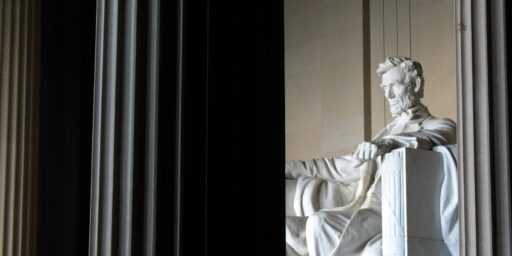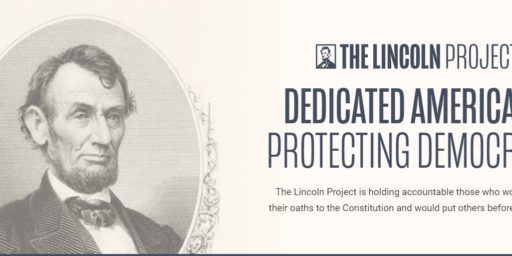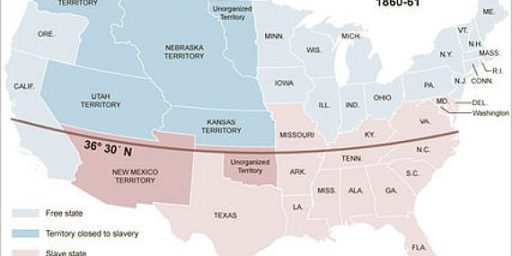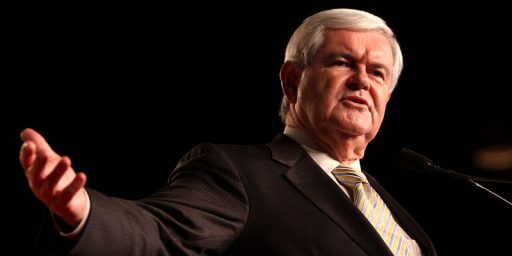What is a Wartime President?
Kevin Drum poses the reasonable question, What is a wartime president?
It’s safe to say that whatever Bush’s NSA program actually involves, no one would have batted an eyelash if FDR had approved a similar program during World War II. Experience suggests that during a period of genuine, all-out war, few people complain when a president pushes the boundaries of the law based on military necessity. But aside from World War II, what else counts as wartime?
If you count only serious hot wars, the United States has been at war for over 20 of the 65 years since 1940. That’s a lot of “wartime.”
However, if you count the Cold War, as conservatives generally think we should, the tally shoots up to about 50 years of war. That means the United States has been almost continuously at war during the past 65 years — and given the nature of the War on Terror, we’ll continue to be at war for the next several decades.
If this is how we define “wartime,” it means that in the century from 1940 to 2040 the president will have had emergency wartime powers for virtually the entire time. But does that make sense? Is anyone really comfortable with the idea that three decades from now the president of the United States will have had wartime executive powers for nearly a continuous century?
Somehow we need to come to grips with this. There’s “wartime” and then there’s “wartime,” and not all armed conflicts vest the president with emergency powers. George Bush may have the best intentions in the world — and in this case he probably did have the best intentions in the world — but that still doesn’t mean he has the kind of plenary power Abraham Lincoln and Franklin Roosevelt exercised during their wars.
I’m writing a longer piece on the subject for publication elsewhere but, suffice it to say, this ship has sailed.
Nearly half a century ago, legal scholar Edward S. Corwin famously wrote that, “The Constitution is an invitation to struggle for the privilege of directing American foreign policy.” Since FDR and, arguably, TR, the president has won that struggle.
The modern president has reversed the Constitutional presumption that Congress is the preeminent branch and the president secondary. Since Roosevelt, it has been axiomatic that “the president proposes, Congress disposes.” That is especially true in foreign policy and even more so in national security matters.
It’s true that Bush doesn’t have the degree of autonomy as FDR and Lincoln. But that’s mostly a function of public perception of the nature of a war–what he can get away with, to put it more crassly–than any limitation of constitutional power. Much of what FDR and others have done is extraconstitutional. But bold wartime leaders have been flouting the Constitution since at least Lincoln, with the full support of the public.






I agree that public perception is key here. In fact, I initially mentioned that in my original post, but ended up cutting it in order to keep from wandering too far afield from my main point.
But that really does get to my main point: Are we “at war”? What’s the public perception? I think that Bush is treating the GWOT as something similar to the Civil War or WWII, and I don’t think public opinion is with him. It would be an interesting conversation to have if it weren’t for the fact that, politically, it’s probably a lose-lose conversation for everyone.
That’s how the Roman Republic went down, isn’t it?
Responding to Drum’s comment, the big problem is the conflation of “war in Iraq” with “war on terror.” I think the public *is* on the same page as Bush, because they’ve mostly gone along with mixing up the two wars.
If there were no occupation ongoing and we had only the GWOT to worry about, Bush would have a much harder time.
Two article worth looking at
1
2
Mal:
Thanks for the links. Please put URLs into HTML code using the “link” button (I’ve edited your comment to do just that).
I was writing a post on the Posner piece while you were tying your comment!
Kevin and Anderson:
Agreed, especially on the point about conflation of the two wars.
The irony is that the public does not perceive the GWOT in the same way as we did WWII while, arguably, the former is a much greater domestic threat.
Only those with an ACLU world view believes the constitution is being flouted.
Censoring free speech in front of abortion clinics is flouting the constitution. Censoring conservative speech on college campuses is flouting the constitution. McCain Feingold is flouting the constitution.
The current read on seperation of church and state is flouting the constitution.
Roe v Wade is flouting the constitution. The ruling on emminent domain is flouting the constitution.
Yet the people who have consistantly flouted the constitution now make that claim against Bush. Massive, gross hypocracy. May they all contract a deadly desease for Christmas.
So where are the “originalists”?
The Founder’s writings on this make sense to me … am I in such a minority today?
Odo: I don’t disagree, although I recognize that changes in technology have made the need for fast action more necessary, which redounds in the executive’s favor.
I merely recognize, though, that we are where we are and aren’t going back. Like the modern interpretation of the Establishment Clause, which I like as a matter of public policy but disagree with on Constitutional grouds, this is so ingrained in our system at this point that we’re just arguing around the edges.
“It’s true that Bush doesn’t have the degree of autonomy as FDR and Lincoln. But that’s mostly a function of public perception of the nature of a war–what he can get away with, to put it more crassly–than any limitation of constitutional power. Much of what FDR and others have done is extraconstitutional. But bold wartime leaders have been flouting the Constitution since at least Lincoln, with the full support of the public. ”
This reminds me of the famous phrase, “a republic, Ma’am, if you can keep it”.
Given the above paragraph, how can you talk about any limits on governmental powers, or branch separation of powers?
Of course we can go back. The pendulum has swung many times before. Most notably from the FDR period to it’s aftermath. IIRC a number of adjustments were made, not just the Presidential term limit, but also to the national security infrastructure.
As far as technology and time … I think people get caught up in increased information flow, but we haven’t really seen death-by-information. They didn’t “hack” their way in for 9/11. They did it the old fashioned way. They physically entered the country, were interviewed by a customs officer … and later “sized a vessel.”
(As you might guess, I think electronic warfare countermeasures are a fruitful path for development.)
Pfft. Siezed not sized.
When Benedict Arnold was reporting to the British, what precautions were in place to protect his rights. I know this was before the Constitution, but the spirit was there. Do sworn enemies of the state have any right to expect protection from that state, by that state?
The nice things about “sworn enemies” is that they declare themselves. None of this messing around with investigations. 😉
Because “the ship has sailed” does not necessarily make it the right way to run the government, especially in this situation.
Yes, the system of checks and balances of powers in the Constitution has been modified in practice, but does this mean we should accept the modifications, especially if they were put in place by statute and not by Constitutional amendments?
From what I have gathered, the Bush administration is essentially claiming that the single declaration passed by Congress for the necessary means to be used to protect against terrorist organizations like the one that perpetrated the September 11, 2001 attacks gives the office of President carte blanche to circumvent any and all protections of civil rights and liberties, whether listed as protected in the Bill of Rights or subsequently declared protected by Congress or judicial rulings.
This is over-reaching, and not consistent with the philisophical underpinnings of our Constitution.
Look Jack, get with it. The constitution is just a piece of paper. Ben Frankilin was just some old timer in funny glasses.
The new rulers of America are creating a new reality.
In this reality, you have less freedom then you used to. Deal with it dude.
“The full support of the public”? Sounds like a galloping over-generalization to me…